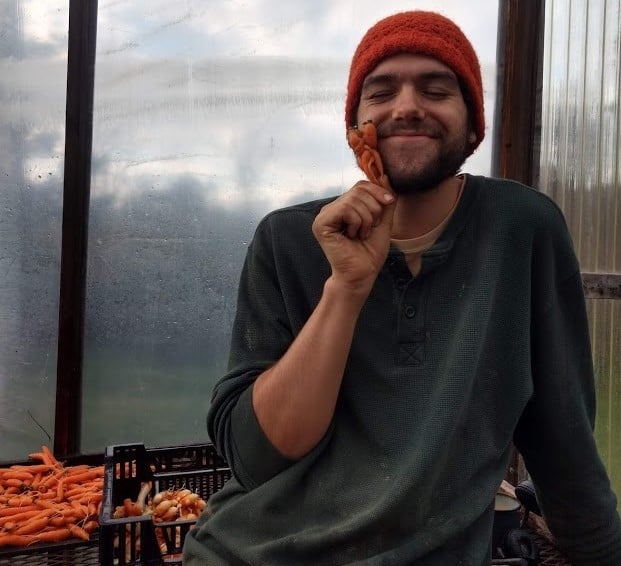
Connecting Community Through Food: An Interview With Up-and-Coming Local Farmer, John Whitmore
Dirt under his nails and a warm smile behind a scraggly beard, John Whitmore of Shagbark Gardens in Danby, NY sat down with me on Tuesday to reflect on his experience in the “Grow Your Farm Business Course”, held every winter here at Groundswell. Situated atop the Autumn Leaves Book Store in a cozy little nook in the Ten Forward Café (John’s favorite building in Ithaca, in part because of Angry Mom Records downstairs), we reflected wistfully on the commercialization of small-town America. Only 24, he’s seen a dramatic transition in his hometown of Dryden, watching beloved family owned businesses relentlessly replaced by chains. John took the Farm Business Course a few years back when he was 21. He was excited to grow his farm and passionate about connecting community with food, but business and accounting didn’t come quite so naturally to him, so he’s participating a second time! Here’s what he had to say about his experience:
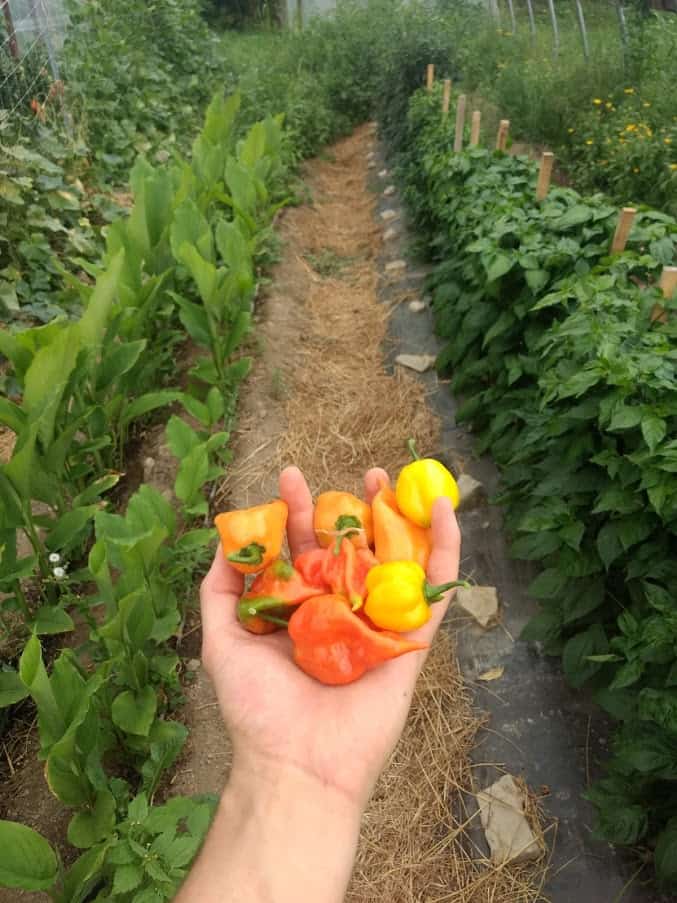
[Groundswell] What made you want to be a farmer?
[John] I’ve always felt connected to food – specifically really good food – and to the natural world. I worked on a large-scale organic veggie farm in high school and loved it, getting my hands in the soil. Working at a CSA was cool because I was around all these people who were passionate about local veggies. While that job wasn’t the best, it set me on a path to find other farms that fit my style better.
At the heart of it, it’s always been the recognition that food – good food – has a power to it. It becomes a whole lifestyle; a holistic lifestyle, where, just by growing food, you’re working your body, you’re outside, you’re connected with the natural rhythm of the earth. Just by doing that alone, you’re also providing yourself and your community with healthy food, whether it be animal or vegetable.
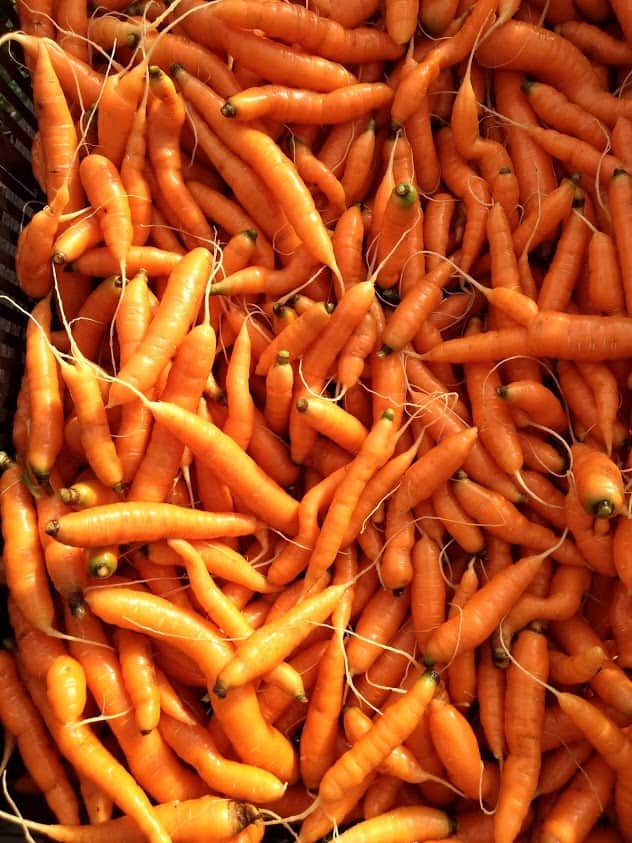
For those not familiar with Groundswell’s Grow Your Farm Business Course, what’s the most important thing you learned from that experience?
At the very beginning of the class, Erica Frenay [from Shelterbelt Farm] taught us about holistic management, which I had never heard about before. It’s a really awesome approach to life in general. It’s about setting goals for how you want to manage yourself and your business so that you are keeping your goals in focus relative to your overall being. It’s a holistic approach, meaning, as you’re growing your business, you’re keeping your own health in mind. Because, without your health, you won’t succeed.
Also, there are two weeks devoted to accounting, led by Leslie Ackerman over who used to work at Alternatives Federal Credit Union. She’s a really excellent teacher and broke down a very dense topic into usable information.
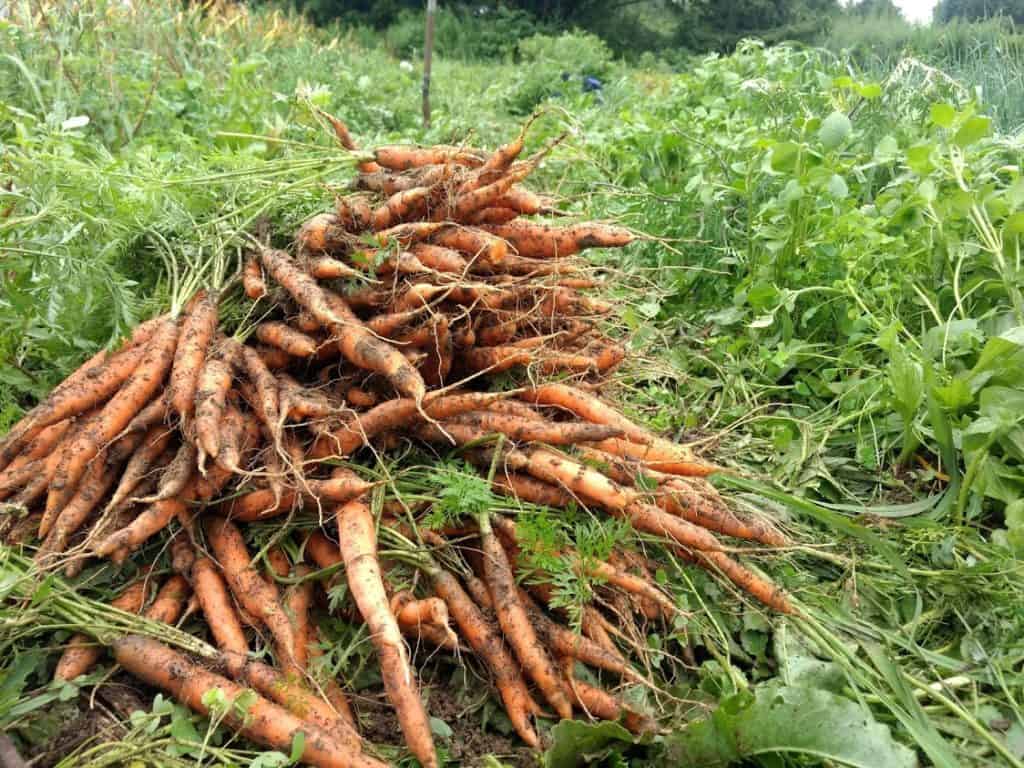
For those aspiring farmers out there: If you could go back five years and give yourself some advice when you were just getting started, what would you want to know?
I very much feel like I’m in the starting process, now. Five years ago, I would have told myself to work on an even greater variety of farms, getting exposure to broader practices. I worked on a handful of farms in the area. I feel like the best way you can learn is by getting hands on with another person’s operation, directly being on the land. There’s only so much you can get from reading books. So, maybe I would have worked more seasons.
Now that I have access to my own land, I think differently. Every single plot of land in the world is unique. You can incorporate so many techniques into your specific plot. Now that I have my perspective, I can plug in those ideas in.
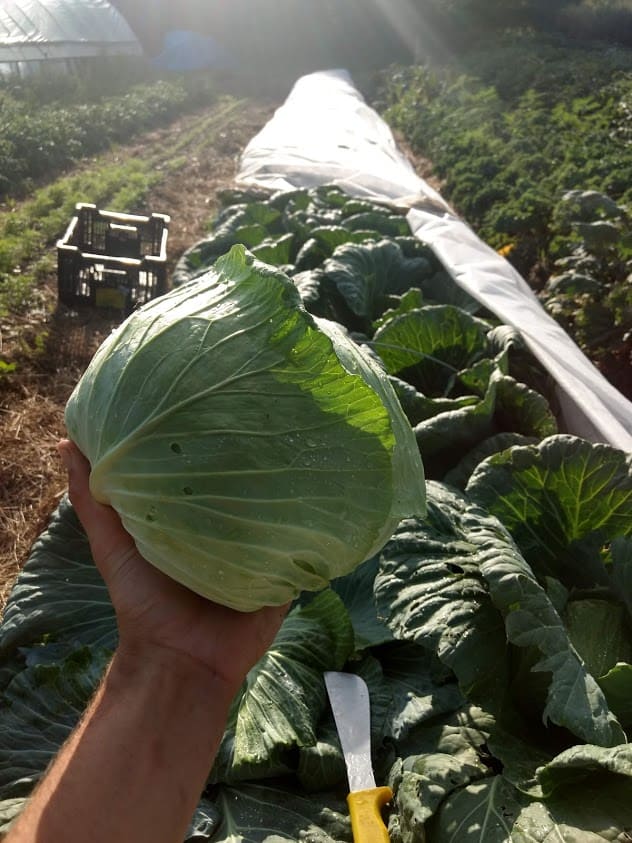
So, we’re curious, there’s no website that we know of yet. You’re kind of “underground” at this point. Can you give us an inside scoop? What are you growing, and, if someone wanted to eat your product, where should they look in the future?
I grow for these people, who’ve just started up, that make hot sauce; they’re called Mojo’s. I grow specialty hot peppers, heirloom tomatoes, and winter squash for them. You can currently buy it at the Carriage House Café, Bickering Twins, and we’re working on getting it into places like Greenstar and Wegmans. That’s cool, because I get to grow along side of them, and we’re looking to scale up in the next couple seasons.
I manage the kitchen at the Carriage House Café. And so, a lot of my produce goes there. I grow a lot of lettuce that we use there and whenever I have an excess of something, we turn it into a special or turn it into pickles. I also grow ginger and turmeric, which mostly goes in bulk to herbalists. I was selling at the Brooktondale’s Farmer’s market this past year. I don’t know if I’ll continue to do that going forward, but there’s a really nice community there.
The last couple seasons I’ve used for a grounds for experimentation. I’m currently working on branding myself and creating a website. For a while, I didn’t really have a farm name that I love, or a clear set of goals for the farm, so I didn’t want to brand one thing when I didn’t feel totally married to it. [John’s farm is now known as Shagbark Gardens] So, I’m using this winter to work on an internet presence. If it were up to me – my natural tendency is to grow food and share it with people. I’m working on how we’re going to do that. I have a certified kitchen, so I’m looking to take the farm, in addition to these wholesale accounts, in a value-added direction. I don’t want to talk too much about that yet, because it’s still in development, but that’s the direction we’re moving in.
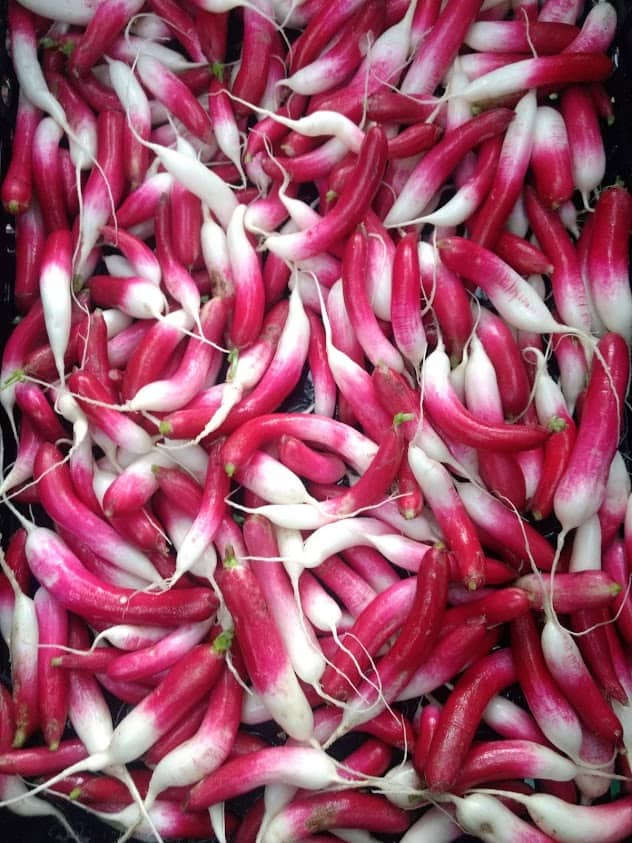
What’s your favorite vegetable?
I really love Daikon Radishes! They’re great storage crops and so delicious. Certain varieties will grow in the funniest ways, like long and gnarly, where the purple Daikon is big and girthy. They’re really beautiful. There are so many good vegetables. I love beets too.
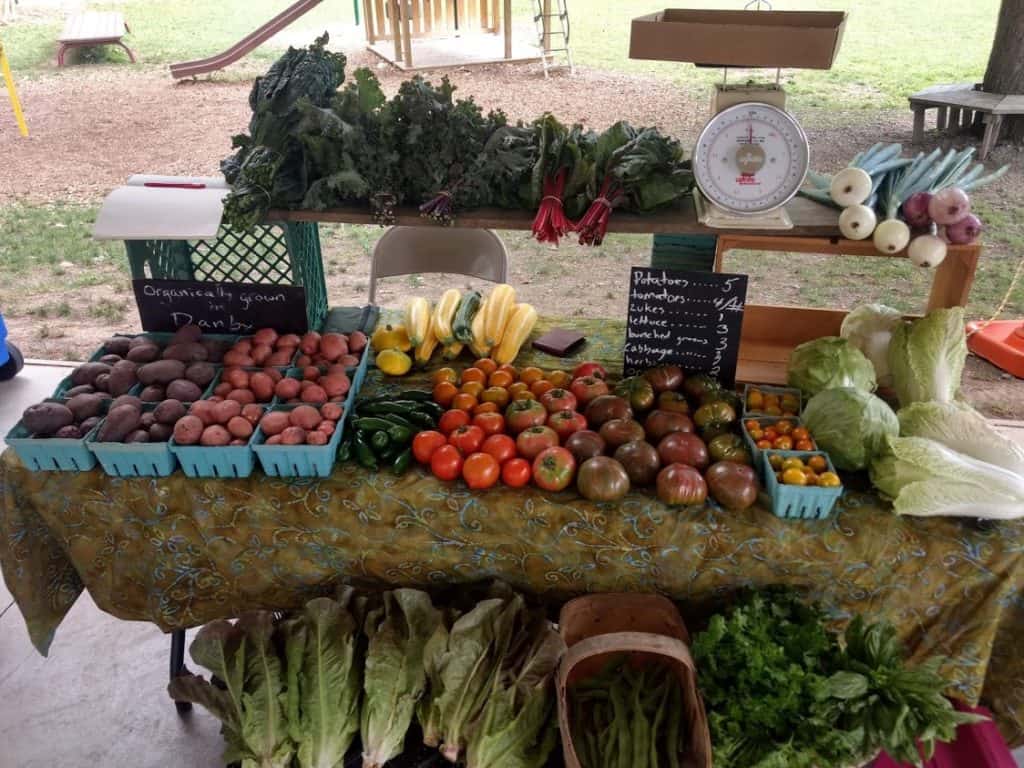
Anything else you’d like the readers to know? About you? About agriculture in general?
I want to continue to grow. I never want to be stuck in my ways. As new knowledge comes out about more sustainable farming practices, I want to continue to work with that. Going from tilling to no till, trying to structure my farm so that it can sustain itself, so I’m not pulling out of the soil, I’m putting back into the soil, and using water wisely. In general, it’s important that everyone does that.
Wide scale, conventional agriculture is destroying the soil. It’s important that we all do our parts to support farming sustainably and to do so ourselves. We don’t necessarily have a lot of power, as citizens, but we do have the power to choose what we buy. So, buying local, knowing the people who are producing what we eat is really important. Maybe that means you go the winter without eating fresh berries so that you don’t support widely shipped food that isn’t necessary.
Working on eating seasonally and eating locally, it can’t be stressed enough how big of a change that can have. Especially if everyone decided to do so.
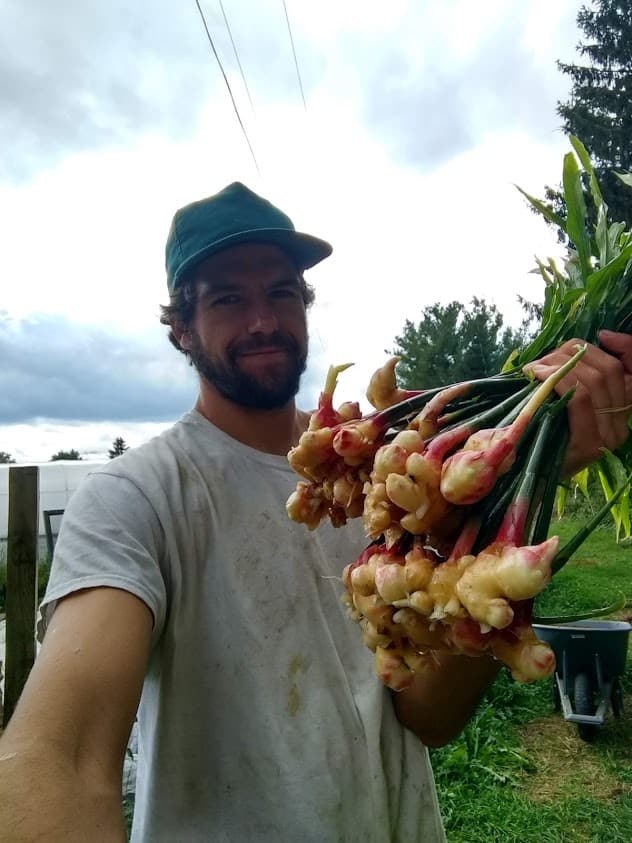
Getting started or expanding YOUR own farm business? The 2020 Grow Your Farm Business Courses has 7 sessions left and you can still register for INDIVIDUAL sessions.
